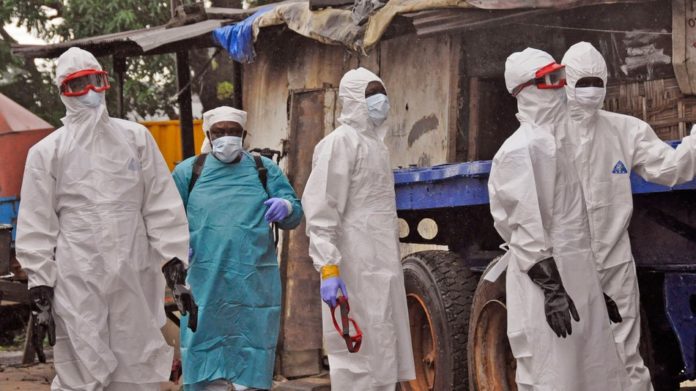Ebola Arrives in Senegal as Outbreak Spreads

DAKAR, Senegal — A man infected with Ebola traveled to Senegal, bringing the disease to that country for the first time in an outbreak that has hit four other West African nations and killed more than 1,500 people, the Ministry of Health said Friday.
The infected person, a university student from Guinea, sought treatment at a hospital in Senegal’s capital, Dakar, on Tuesday but gave no indication he might have Ebola, Health Minister Awa Marie Coll Seck told reporters. The next day, an epidemiological surveillance team in Guinea alerted Senegalese authorities that they had lost track of a person who had had contact with sick people. The team said that the person disappeared three weeks ago and may have come to Senegal.
The student was tracked to the hospital in Dakar that same day and was immediately quarantined, Seck said.
A test has confirmed that he has Ebola, and the World Health Organization has been alerted.
It is not clear how or when the young man came to Senegal, which closed its border with Guinea last week. Seck said his condition is “satisfactory.”
The virus ravaging West Africa
The Ebola outbreak ravaging West Africa began last year in Guinea. Since then, the disease has spread to Liberia, Sierra Leone and Nigeria. More than 3,000 people have contracted the disease, which is spread by bodily fluids and for which there is no licensed treatment or vaccine. A separate Ebola outbreak was reported this week in Congo, where 13 people have died from the disease.
The arrival of the dreaded disease in Senegal, which is a tourist destination and whose capital is a major transportation hub for the region, underscores that the outbreak remains out of control, despite efforts by the World Health Organization, Doctors Without Borders and other organizations.
WHO on Friday said the past week has seen the highest increase of cases — more than 500 — since the outbreak began.
Dr. Tom Frieden, the director of the U.S. Centers for Disease Control and Prevention, warned that more needs to be done to avoid the worst.
“Emergency action needs to be taken to reverse the situation to avoid a catastrophe,” he said during a visit to Sierra Leone.
WHO, which is the U.N. health agency, has warned that the disease could eventually infect 20,000 people, and unveiled a plan Thursday to stop transmission in the next six to nine months.
But a top official from Doctors Without Borders, which is running many of the Ebola treatment centers, said the agency wasn’t doing enough.
“The World Health Organization can’t handle” the outbreak, Mego Terzian, the group’s president for France, told France Inter radio. “I don’t see how, with the current measures, we’re going to control the outbreak.”
He called for a far greater response from the international community, saying the U.N. Security Council should take up the matter and noting that there are countries with military medical units that could be useful.
A study published this week, provides clues to the origin of the outbreak in Sierra Leone. The data points to two genetically distinct lineages of the Ebola virus from Guinea that can be traced to a dozen individuals who attended the same funeral of an Ebola patient there.
The genetic data shows that the Ebola strains responsible for the current outbreak are distinct, with unique mutations, but that they likely have a common ancestor traced to the first recorded outbreak in 1976.
‘The situation is worsening’
In a detailed report Friday, WHO said more than 500 cases were recorded over the past week, by far the worst toll of any week so far. The week before, around 400 new cases were reported.
“There are serious problems with case management and infection prevention and control,” the report said. “The situation is worsening in Liberia and Sierra Leone.”
Meanwhile, the World Food Programme is increasing its operations in the countries affected by Ebola. “The operation has been quite intense and we intend to scale it up as the need arises,” said WFP’s Etienne Christopher Saint-Jean.
Because there is no known cure for Ebola, doctors can only isolate the sick and try to help their immune systems fight off the disease. But one previously untested drug has been tried in this outbreak. It’s still unclear whether it’s effective. On Friday, a Liberian physician’s assistant and a Congolese doctor who received the ZMapp drug in Liberia were expected to be released from the hospital.
The California-based company that makes ZMapp has said its supplies are exhausted, and it will take months to make more.
The hardest-hit countries have sealed off entire villages or neighborhoods, several countries in the region have closed their borders and major airlines have suspended flights to those locations.
Measures to control the outbreak have sometimes provoked unrest. On Thursday, people in a town in southern Guinea ransacked a market that had been disinfected and attacked the vehicles of sanitation workers.
Clashes also broke out in Monrovia last week after Liberia instituted a quarantine in West Point, a slum that is home to tens of thousands of people.
The World Health Organization has warned that closing borders is ineffective, especially in a region where people easily avoid official crossings, and that canceling flights is only exacerbating the crisis by making it harder to get aid workers and supplies into infected countries.
“We have to install health security measures at airports and on borders,” Terzian said. “We can’t create a prison in the region and watch the Africans die.”
